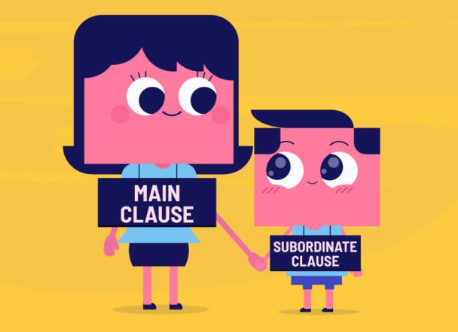
Day: 16/17 Sub: English Std.: 10th
————————————————————————-
16, 17. Main and Subordinate Clauses
Day 16 & 17 Std.10th Bridge Course 2023-24 Main and Subordinate Clauses
Day – 16
Learning Outcome:
Sentence Structure: Types of clauses – Passive Constructions.
Learning Activity/Experience:
Teacher writes sentences on the board.
Teacher asks student to read them silently.
Teacher explains the main clause and a subordinate clause.
Teacher asks student to denote the main and subordinate clause.
Student denotes the main and a subordinate clause.
A Clause is a group of words that contains a Subject and a Predicate. The subject of a Clause may be expressed or understood. There are two types of Clauses:
1) The Main Clause (Principal Clause) – It means a group of words that has its own
meaning. It is independent and complete in meaning.
Example:
1) Eat your breakfast before it gets cold.
2) The dog that was spotted chased me across the road.
2) A Subordinate Clause (Dependent Clause) – It means also a group of words that doesn’t have its own meaning. For meaning, it depends on the main clause. So, it is also called a dependent clause.
Day – 17
1) A subordinate clause always begins with a subordinating conjunction.
Example:
1) The Taj Mahal is a tourist site which is located in Agra.
2) My grandma remembers the day when there was no mobile.
Solved/Demo Activity:
Teacher writes sentences on the board.
Teacher explains the types of clauses and their definitions.
Teacher draws the table of subordinators.
Student listens attentively.
The subordinate clause has three types :
1) Noun Clause: A noun is a dependent clause that acts as noun in the sentence, whether they are subjects, objects, or subject complements.
2) Adjective Clause: An adjective clause is a dependent clause that gives information about nouns.
3) Adverb Clause: An adverb clause is a group of words that modifies the main verb in the independent clause. It contains a subject and a predicate of its own and does the work of an adverb.
Examples:
1) I think that we should always speak the truth. (Noun)
2) The umbrella, which is red, is mine. (Adjective)
3) Our class stops working when the bell rings. (Adverb)
Subordinators in clauses as follows:
| Noun Clause | Adjective Clause | Adverb Clause |
| That, what, how | who, whom, which, that, whose, when, where | so, when, as, because, since, till, if, until, whenever, whether, unless, though, although, even, though, etc. |
Read the following sentences, underline the subordinate clause and name them.
1) My friend helped me when I was in need. (Adverb clause)
2) This is a girl who is clever in the study. (Adjective clause)
3) We knew that he was guilty. (Noun clause)
Practice:
Teacher will divide the class into groups, one group will have a photocopy of the main clause and the other group will have the subordinate clause.
Teacher will ask the student to match the main clauses to the subordinate clauses.
| Main clauses | Subordinate clauses |
|
|
Ans:
Match the main clauses to the subordinate clauses
1) Although she has a busy schedule, Sarah loves to read books.
2) Because they practiced tirelessly, the team won the championship trophy.
3) Jack will join us for dinner tonight if he finishes his work on time.
4) Since it received positive reviews, the movie was excellent.
5) I want to travel to Europe next summer where the weather is pleasant.
Extension/Parallel Activity/Reinforcement:
Add clauses meaningfully.
1) These are the courageous boys…………..
2) Raj did not come to school……………….
3) The car driver did not know……………
4) This is a garden…………………………..
5) It is ……………………………………….
6) He …………………………………………
Ans:
- These are the courageous boys who fearlessly faced the challenges ahead.
- Raj did not come to school because he was feeling unwell.
- The car driver did not know where was his destination.
- This is a garden which is so beautiful.
- It is raining heavily outside, so we should take umbrellas with us.
- He, who had just finished his exams.
